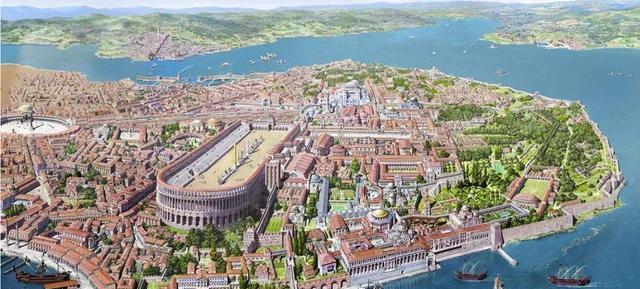Introduction: As an important invention that changed military history, gunpowder dominated the battlefield after modern times. But before gunpowder was invented, the Eastern Roman Empire, located at the junction of Europe and Asia, had a weapon as powerful and terrifying as gunpowder. Many believe that this long-lost ultimate weapon protected the Eastern Roman Empire for thousands of years, shielding Constantinople from double-digit attacks. This weapon, which the Byzantines called "fire of the sea" and "liquid flame", but its most widely circulated name is the Arab name for it - "Greek fire".

The Eastern Roman Empire, also known as the "Byzantine Empire", was capitalized in Constantinople
In 678 AD, Constantinople was at a critical juncture. The imperial Arab navy, under the command of the "Caliph" Muawiyah, attacked Constantinople for five consecutive years, and the great imperial capital suffered a severe sea blockade. In a desperate situation, Emperor Constantine IV obtained a good strategy, that is, the recipe and use of "Greek fire".
The "Zhenguo Artifact" that has repeatedly saved the Empire
On 25 June, the Arab fleet launched a general attack on Constantinople. The Eastern Roman Navy dispatched small boats, pointing their siphons at enemy warships and randomly spewing ferocious flames. Unprepared Arab naval vessels caught fire. The Commander-in-Chief of the Arab Fleet, Fadallas, ordered the fleet to withdraw, but about two-thirds of the ships had been burned. To escape the counter-siege of the Byzantine navy, Muawiyah ordered the remaining Arab ships to retreat south. However, the Byzantine navy took advantage of the victory and, after pursuing the enemy, used Greek fire again, leaving the Arab navy almost completely destroyed.
The Byzantine Navy used the "Greek Fire" to strike at the Arab fleet
The Arab Empire, after its worst defeat, had to demand peace talks, and in the same year, the two sides concluded a 30-year peace treaty, and the "caliph" Muawiyah surrendered and paid tribute to the Byzantine Empire. This landmark military victory had a strong impact in Eastern Europe, and the leaders of the Slavic tribes in the north of the empire also went to Constantinople to show their submission.
The victory in the summer of 678 was highly regarded by later generations as the most serious setback and deterrence of Arab military expansion when the momentum of Arab military expansion was in full swing, and the Arabs' plan to conquer Europe was ruined.
Pictured is the "Caliph" Muawiyah attacking Constantinople
Of course, in the long history of the Empire for thousands of years, the "Greek fire" has saved the Empire countless times in critical moments since then, and has shocked the enemy army with its great destructive and terrifying colors.
In the summer of 717 AD, the Arabs divided into two routes and attacked Constantinople again. After unsuccessful attempts at land attacks, the Arab armies again decided to adopt the tactic of sea blockade, turning Constantinople into a dead city. On 1 September, an Arab fleet attempted to blockade the Golden Horn, and Emperor Leo III immediately ordered the fleet to go to war, using Greek fire to destroy twenty Arab warships and capture the remaining warships, breaking the blockade in one fell swoop.
The Arabs tried to occupy Constantinople
The following spring, Leo III, after receiving accurate information, sent a fleet and destroyed the Arab fleet with Greek fire. In this siege, the Arab Imperial army dispatched as many as 2560 ships, but only 5 warships returned safely to the Syrian coast and Alexandria.
"Greek fire" is lost
According to some historical records, "Greek fire" was invented by Gallinikos, a chemistry enthusiast who worked in the Syrian provinces. After the fall of Syria, he fled to Constantinople. As the "ultimate protective weapon" and military secret of the Eastern Roman Empire, "Greek fire" received unprecedented attention from the royal family. All "Greek fires" were secretly developed and produced by officials in charge of ordnance and weapons production in the Grand Palace in Constantinople. Its formulation and preparation cannot even be recorded in writing. ”
A reference to the "Greek fire"
The specific formula for "Greek fire" has been lost with the final fall of Constantinople in 1453, and scholars speculate that the composition of "Greek fire" may have a large number of flammable substances, which are viscous grease with oil as the main body and mixed with flammable resin and sulfur, which is flammable but less explosive, so it is easy to carry and transport. It is unique in that it can float and burn on the surface of water, and it is easy to attach to the surface of the object, so that its points are not easily extinguished. The extreme secrecy of the "Greek Fire" production techniques and raw materials, as well as the loss of their heritage, have painted this medieval "Zhenguo Artifact" with a strong mysterious color.
Crusades
The influence of Greek fire on future generations
Although with the fall of Constantinople and the transition of Europe from the Middle Ages to modern times, more powerful gunpowder replaced the lost "Greek fire" as the protagonist of the war. But in the technology-starved Middle Ages, the "Greek fire" had a terrifying deterrent unimaginable in the gunpowder era. As the 13th-century French aristocrat Juanville recorded in his recollection of the Crusades: "Whenever the enemy attacks us with Greek fire, all he does is to get down on his knees and pray for heaven's salvation." ”